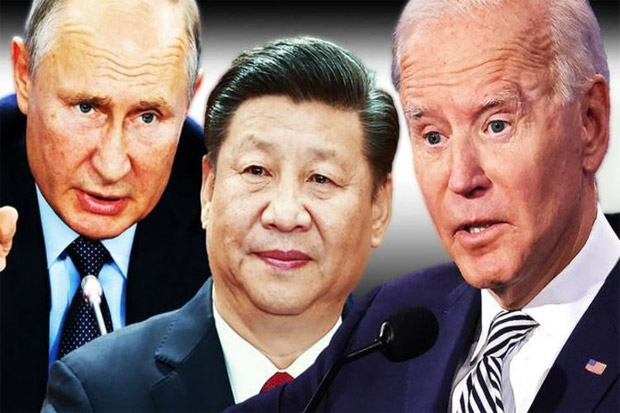
Vladimir Putin-Joe Biden-Xi Jin Ping. Sumber foto : www.sindonews.com
STRATEGIC ASSESSMENT. The U.S. government was unable to confirm claims that China had used spy balloons to fly over sensitive military sites earlier this year and collect data in real-time.
According to the government, the spy balloon’s analysis is still ongoing. NBC News reported that Chinese balloons were able to transmit data to Beijing in real time despite efforts by the U.S. government to stop them, citing two senior U.S. officials and one former senior official.
Pentagon Spokesperson Sabrina Singh said they could not confirm the account. Meanwhile, the Chinese Foreign Affairs Ministry in Beijing and the Chinese Embassy in Washington, D.C. did not respond to the comments.
China’s military maintains at least one submarine capable of carrying a nuclear-tipped ballistic missile in the waters between Hainan Island and the South China Sea. The new patrols show the Chinese Navy’s progress in areas such as logistics, command, surveillance, and weapons.
This was revealed in the Pentagon’s November 2022 report, which was only made public earlier this April. According to the 174-page report, China now has the capability to deploy submarine patrols over a longer period of time, as the United States, Russia, the United Kingdom, and France have done for decades. The submarines used in the operation were also outfitted with a third-generation missile, the JL-3, according to the report.
Risking China’s ire, House Speaker Kevin McCarthy welcomed Taiwan President Tsai Ing-wen to a high-level meeting on U.S. soil as a “great friend of America” in a fraught show of U.S. support. More than a dozen Democratic and Republican lawmakers, including the House’s third-ranking Democrat, joined Republican McCarthy for the talks at southern California’s Ronald Reagan Presidential Library, against a backdrop of rising tensions between the U.S. and China.
The Biden administration called off Blinken’s planned trip to Beijing in February after a Chinese spy balloon traversed U.S. skies, but has since been trying to restart high-level talks. That includes rescheduling the Blinken visit, and setting up other trips by top U.S. officials and a phone call between President Joe Biden and Chinese leader Xi Jinping, a current U.S. official and a former State Department official said.
But China is rebuffing the U.S. efforts, the people said, and its willingness to fully engage may hinge on the drama meeting in California between Taiwanese President Tsai Ing-wen and Republican House Speaker Kevin McCarthy. Beijing’s current aversion to sustained high-level engagement underscores the particularly fraught nature of U.S.-Chinese relations over the past few months.
Indonesia and ASEAN are positioned at the intersection of military defense power and the world’s largest economy. The formation of the AUKUS trilateral defense pact, as well as the strengthening of China’s dominance, necessitate that ASEAN act prudently in order to maintain the Indo-Pacific region’s favorability. The United States, the United Kingdom, and Australia decided to establish a new defense alliance called AUKUS, which is an acronym for the three members, in September 2021.
The three countries’ collaboration is purportedly intended to balance out China’s sway in the Indo-Pacific region. While the three leaders did not explicitly mention China’s strength and presence in the region, they did express concerns about the security of a region that is “developing significantly.”
Fears of nuclear war have resurfaced after a 40-year hiatus. Some people believe that nuclear weapons keep the world safe from war. With the help of various treaties that restrict, reduce, and outlaw the proliferation of nuclear weapons, the great power can be diminished and nuclear weapon owners do not proliferate as feared in the early days of the nuclear age.
The United States and its allies are currently pressuring Iran and North Korea to halt their nuclear programs. However, North Korea and Iran, like India and Pakistan, are difficult to contain. The most recent fears of nuclear war were sparked by Russian President Vladimir Putin’s March 25 announcement that he would deploy nuclear missiles in Belarus. Russia will also equip Belarusian fighter planes with nuclear weapons.
Deteriorating relations between Beijing and Washington have constrained US exports of aircraft to China, analysts said, with decoupling set to cause a further decline in aviation trade in the future.
China and the United States have been locked into a bitter trade battle since 2018 and the two countries are competing intensely in technology and defence, as well as for international influence.
“I do not see decoupling happening in the short term due to the close link between China and the rest of the world. But in the long term, decoupling is a trend that will continue,” said Henry Gao, an associate professor of law at Singapore Management University, and a long-time researcher of international trade issues.
Wall Street fell as evidence of a cooling economy exacerbated worries that the Federal Reserve’s campaign to rein in decades-high inflation may cause a deep downturn.
All three major stock indexes were lower at mid-day after data showed U.S. job openings in February dropped to the lowest level in nearly two years, suggesting that the labor market was cooling, while factory orders fell for a second straight month. Data on Monday had also pointed to weakening U.S. manufacturing activity.
“The number of job openings has decreased, which makes people worry that hiring is going too slow, and that will be bad for the economy. That feeds into recessionary fears,” said Sal Bruno, Chief Investment Officer at IndexIQ in New York. Bank stocks took a hit after JPMorgan Chase & Co CEO Jaime Dimon warned in a letter to shareholders that the U.S. banking crisis is ongoing and that its impact will be felt for years.





